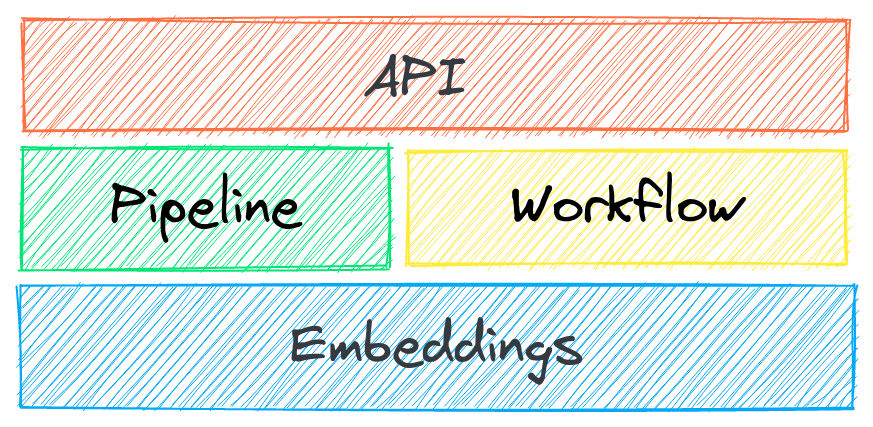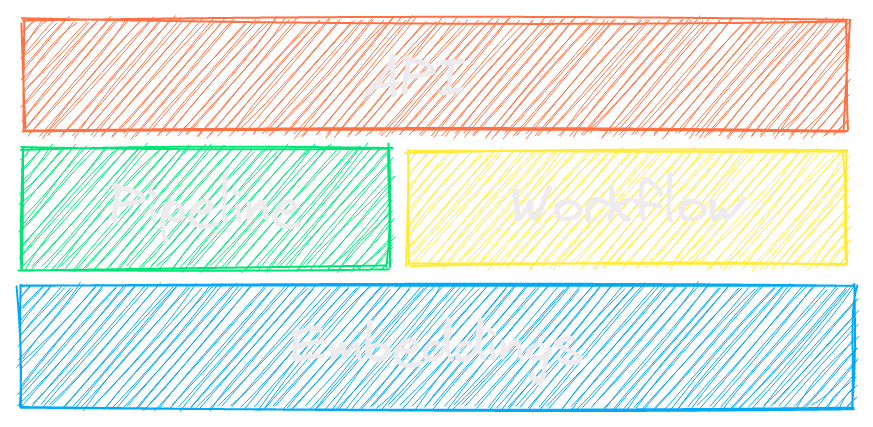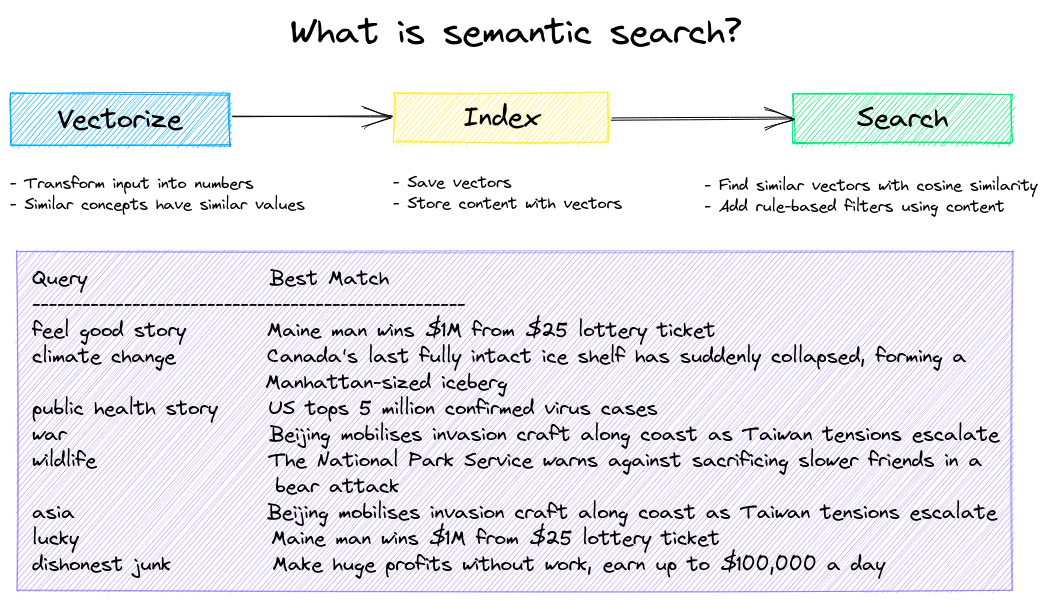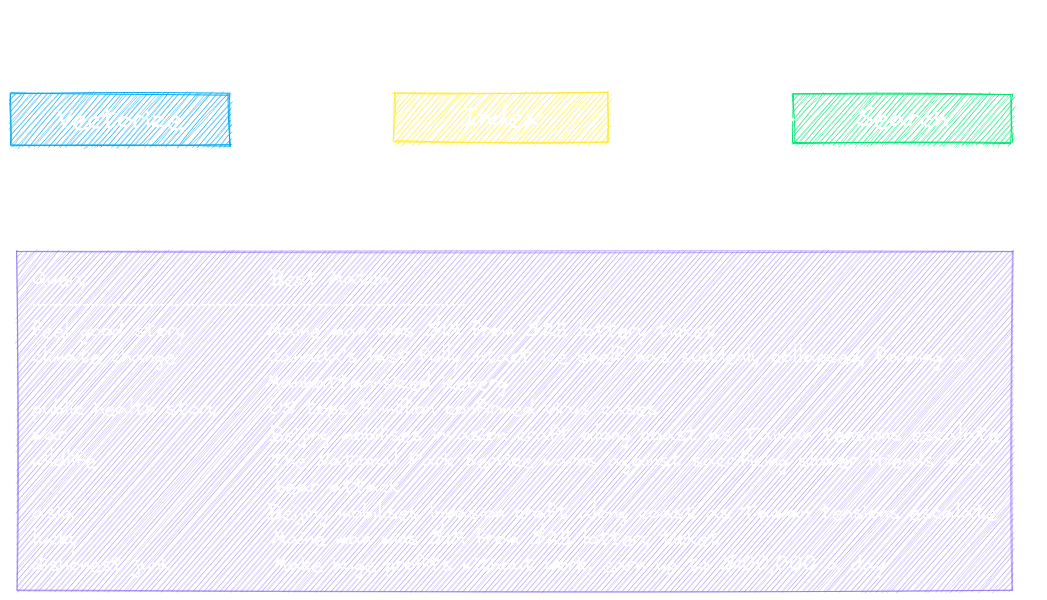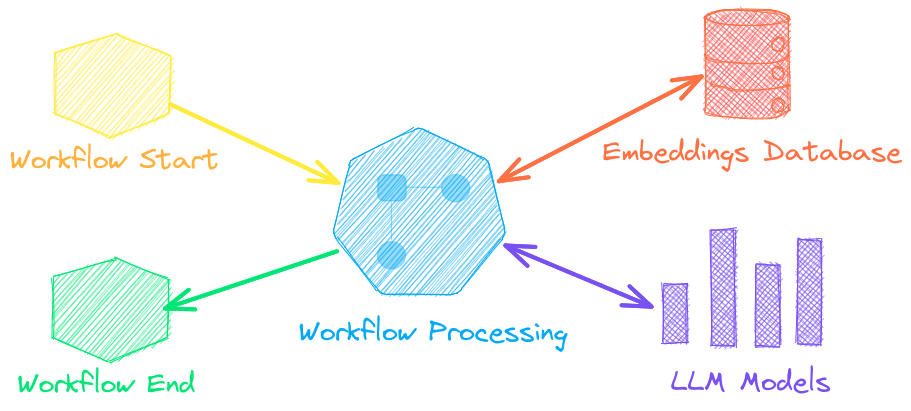All-in-one embeddings database
txtai is an all-in-one embeddings database for semantic search, LLM orchestration and language model workflows.
Embeddings databases are a union of vector indexes (sparse and dense), graph networks and relational databases. This enables vector search with SQL, topic modeling, retrieval augmented generation and more.
Embeddings databases can stand on their own and/or serve as a powerful knowledge source for large language model (LLM) prompts.
Summary of txtai features:
- 🔎 Vector search with SQL, object storage, topic modeling, graph analysis and multimodal indexing
- 📄 Create embeddings for text, documents, audio, images and video
- 💡 Pipelines powered by language models that run LLM prompts, question-answering, labeling, transcription, translation, summarization and more
- ↪️️ Workflows to join pipelines together and aggregate business logic. txtai processes can be simple microservices or multi-model workflows.
- ⚙️ Build with Python or YAML. API bindings available for JavaScript, Java, Rust and Go.
- ☁️ Run local or scale out with container orchestration
txtai is built with Python 3.8+, Hugging Face Transformers, Sentence Transformers and FastAPI. txtai is open-source under an Apache 2.0 license.
Interested in an easy and secure way to run hosted txtai applications? Then join the txtai.cloud preview to learn more.
New vector databases, LLM frameworks and everything in between are sprouting up daily. Why build with txtai?
# Get started in a couple lines
import txtai
embeddings = txtai.Embeddings()
embeddings.index(["Correct", "Not what we hoped"])
embeddings.search("positive", 1)
#[(0, 0.29862046241760254)]- Built-in API makes it easy to develop applications using your programming language of choice
# app.yml
embeddings:
path: sentence-transformers/all-MiniLM-L6-v2CONFIG=app.yml uvicorn "txtai.api:app"
curl -X GET "http://localhost:8000/search?query=positive"- Run local - no need to ship data off to disparate remote services
- Work with micromodels all the way up to large language models (LLMs)
- Low footprint - install additional dependencies and scale up when needed
- Learn by example - notebooks cover all available functionality
The following sections introduce common txtai use cases. A comprehensive set of over 50 example notebooks and applications are also available.
Build semantic/similarity/vector/neural search applications.
Traditional search systems use keywords to find data. Semantic search has an understanding of natural language and identifies results that have the same meaning, not necessarily the same keywords.
Get started with the following examples.
| Notebook | Description | |
|---|---|---|
| Introducing txtai |
Overview of the functionality provided by txtai | |
| Similarity search with images | Embed images and text into the same space for search | |
| Build a QA database | Question matching with semantic search | |
| Semantic Graphs | Explore topics, data connectivity and run network analysis |
LLM chains, retrieval augmented generation (RAG), chat with your data, pipelines and workflows that interface with large language models (LLMs).
Integrate LLM chains (known as workflows in txtai), multiple LLM agents and self-critique.
See below to learn more.
| Notebook | Description | |
|---|---|---|
| Prompt templates and task chains | Build model prompts and connect tasks together with workflows | |
| Integrate LLM frameworks | Integrate llama.cpp, LiteLLM and custom generation frameworks | |
| Build knowledge graphs with LLMs | Build knowledge graphs with LLM-driven entity extraction |
Retrieval augmented generation (RAG) reduces the risk of LLM hallucinations by constraining the output with a knowledge base as context. RAG is commonly used to "chat with your data".
A novel feature of txtai is that it can provide both an answer and source citation.
| Notebook | Description | |
|---|---|---|
| Build RAG pipelines with txtai | Guide on retrieval augmented generation including how to create citations | |
| Advanced RAG with graph path traversal | Graph path traversal to collect complex sets of data for advanced RAG | |
| Advanced RAG with guided generation | Retrieval Augmented and Guided Generation |
Language model workflows, also known as semantic workflows, connect language models together to build intelligent applications.
While LLMs are powerful, there are plenty of smaller, more specialized models that work better and faster for specific tasks. This includes models for extractive question-answering, automatic summarization, text-to-speech, transcription and translation.
| Notebook | Description | |
|---|---|---|
| Run pipeline workflows |
Simple yet powerful constructs to efficiently process data | |
| Building abstractive text summaries | Run abstractive text summarization | |
| Transcribe audio to text | Convert audio files to text | |
| Translate text between languages | Streamline machine translation and language detection |
The easiest way to install is via pip and PyPI
pip install txtai
Python 3.8+ is supported. Using a Python virtual environment is recommended.
See the detailed install instructions for more information covering optional dependencies, environment specific prerequisites, installing from source, conda support and how to run with containers.
See the table below for the current recommended models. These models all allow commercial use and offer a blend of speed and performance.
Models can be loaded as either a path from the Hugging Face Hub or a local directory. Model paths are optional, defaults are loaded when not specified. For tasks with no recommended model, txtai uses the default models as shown in the Hugging Face Tasks guide.
See the following links to learn more.
- Hugging Face Tasks
- Hugging Face Model Hub
- MTEB Leaderboard
- LMSYS LLM Leaderboard
- Open LLM Leaderboard
The following applications are powered by txtai.
| Application | Description |
|---|---|
| txtchat | Retrieval Augmented Generation (RAG) powered search |
| paperai | Semantic search and workflows for medical/scientific papers |
| codequestion | Semantic search for developers |
| tldrstory | Semantic search for headlines and story text |
In addition to this list, there are also many other open-source projects, published research and closed proprietary/commercial projects that have built on txtai in production.
- Introducing txtai, the all-in-one embeddings database
- Tutorial series on Hashnode | dev.to
- What's new in txtai 7.0 | 6.0 | 5.0 | 4.0
- Getting started with semantic search | workflows
- Running txtai at scale
Full documentation on txtai including configuration settings for embeddings, pipelines, workflows, API and a FAQ with common questions/issues is available.
For those who would like to contribute to txtai, please see this guide.









